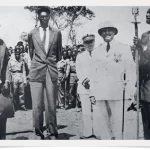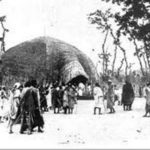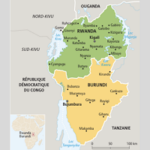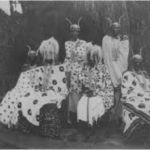The Troubled Accession of Musinga
Near the end of February 1897, Musinga and Kanjogera were officially enthroned, the son taking the reign name of Yuhi V, the mother, Nyirayuhi. Those biru who had opposed the illegitimate transfer of power had already been eliminated by Kanjogera, Kabare, and Ruhinankiko. Those who remained obliged the Bega triumvirate by performing the necessary formalities to mark the beginning of a new reign.
A few weeks after the completion of the ceremonies, the Court was visited by a Captain Ramsay, who was accompanied by two other German officers and three hundred armed soldiers. Ramsay had been ordered by the governor of German East Africa to open the area to German trade. He found the Court suspicious and reserved. Although it readily provided him with supplies, it declined to receive him immediately. Impatient after a delay of two days, Ramsay mustered his officers, soldiers, and brass band and marched into the royal enclosure. Passing through a thousand or so men, all completely silent and all armed with spears, Ramsay uneasily entered the official residence.He assumed that the middle-aged man who met him wearing fine skins and a beaded headdress was Yuhi Musinga. The man who played the role of mwami, however, was actually Mpamarugamba, a notable in charge of the worship of the Imandwa spirits at the Court. In ordering him to replace Musinga, Kanjogera and her brothers must have reasoned that the powerful ritualist would be more able than a vulnerable boy to withstand whatever mysterious forces the visitor could call into play. Mpamarugamba was assisted by a “gigantic” notable who must have been Ruhinankiko. Kanjogera herself may well have followed the proceedings from behind a screen, but she did not dare to meet the European.
Ramsay recounts that after he had explained his mission, Mpamarugamba agreed to accept German protection and a German flag. The acting mwami then complained vigorously about Belgian incursions into Rwandan territory.In return for protection from the German Empire, Ramsay requested a guarantee of Rwandan loyalty in the form of a pact of blood brotherhood. Mpamarugamba revealed not the least dismay at this suggestion, although blood brotherhood was perhaps the most solemn engagement which a Rwandan could undertake and was certainly not to be entered into lightly with such a strange partner. He glibly explained to Ramsay that since he was a monarch and since Ramsay was a great man and representative of a powerful king, it would hardly be appropriate for them to execute the pact as ordinary people did, by cutting their skins and ingesting a few drops of the other’s blood. Instead, with the aid of Ruhinankiko, the dignitaries each proceeded to tie a long blade of grass around the waist of the other; then, as Ramsay put it, “we energetically shook hands and the blood brotherhood between the king of Rwanda and me was established.”
The German officer left the Court highly satisfied with what he called “the main political success of the expedition,” completely unaware of how the Rwandans must have scorned his naive acceptance of a mock ritual with a false mwami. Much to the relief of the Court, Ramsay then headed south toward Burundi. At the last moment he decided not to leave Rwanda without trying to find the sources of its two main rivers, the Akanyaru and the Nyabarongo. Uncertain of Ramsay’s intentions, the Court ordered its guides to keep him from finding them. He laboriously searched the southern part of Rwanda for ten days before admitting defeat. He finally left the kingdom without knowing that he once had been only a fifteen minute walk from one of the sources.
Ramsay’s caravan demonstrated a wealth and power that the Court realized could be useful in dealing with its enemies. The promise of German defense against the Belgians and their Congolese troops and against any internal threat must have encouraged the Court to accept graciously an arrangement it could not have refused. That the German officer required nothing concrete in return, and that he seemed so easy to manage with a combination of courtesy and deception, most likely reinforced the Court’s willingness to enter into the agreement. The experience with Ramsay proved the advantages of dealing with the Europeans by diplomacy, just as the disaster at Shangi had demonstrated the impossibility of meeting them with force.
Only a month or so after Ramsay had left the country, Kanjogera and her brothers were faced with a serious revolt in the south Muhigirwa, a son of Rwabugiri, had tacitly agreed to the coup by withdrawing the forces he commanded from Rutarindwa’s side shortly before the attack at Rucunshu. After the coup, he had recognized Musinga as mwami. But Muhigirwa’s submission turned into revolt after intriguers convinced him that the Court intended to kill him. Since the Bega triumvirate were executing many whom they supposed to be their enemies, Muhigirwa had good reason to fear for his life. To rally support against the Bega, Muhigirwa proclaimed his own son mwami. The forces under Muhigirwa’s command were the strongest in the kingdom, so the Court met his challenge first through political maneuvering: by threats or promises of rewards it won over many of his most influential followers. When the two sides finally came to battle, Muhigirwa’s forces were greatly outnumbered. After a brief skirmish, Muhigirwa killed himselfMuhigirwa’s revolt touched off a second uprising in the northeastern part of the kingdom. One of Muhigirwa’s followers led devastating attacks against the supporters of Musinga but failed to win the much needed allegiance of two sons of Rwabugiri, Baryinyonza and Burabyo. After defeating Muhigirwa, the troops of the Court moved to the northeast and captured his supporters and the two princes who still professed their loyalty to Musinga.
The main thrust of the northeastern revolt lay not in the raids by Muhigirwa’s followers but in a simultaneous and perhaps coordinated insurrection called Ruyaga, the “Tempestuous Wind.” Its leader, Mutwewingabo, rallied the support of a large Hutu lineage, the Bateke, who lived dispersed in Buganza, Rukiga, and Buyaga.The Bateke were said to have rescued from troops of the Court one of Rwabugiri’s wives, named Muserekande, a woman originally from Buha but who had subsequently lived in the region of Bwanacyambwe.With her was her son by Rwabugiri, Biregeya, who was still a child. The Court believed that the Bateke wanted to place Biregeya on the throne. At about the same time another of Rutarindwa’s supporters, Sebakara, who had fled to the northwestern province of Bugoyi, began inciting the people in that area to revolt against Musinga, prophesying that Biregeya would soon be enthroned as mwami. Although Sebakara was given refuge by the people of Bugoyi, his prophecy was not widely accepted.
Mutwewingabo and Sebakara, and perhaps their closest followers, may indeed have wanted to win the throne for Biregeya. But most of the Bateke and people of Bugoyi were interested not so much in replacing one of Rwabugiri’s sons by another as in rejecting royal control over their regions. Their uprisings sparked others throughout the parts of northern Rwanda that had first been brought under firm royal control by Rwabugiri. The Hutu rose up in movements that were local and short-lived under the leadership of their lineage heads. They aimed only to expel representatives of the Court who had recently taken up residence in their regions or to chase off notables who had arrived to collect the ikoro.
The troops of the Court first put down the rising of the Bateke, dealing them such a severe blow that they were never again an important lineage. Similarly, Muserekande and Biregeya were supposed to have drowned themselves to avoid capture by the troops that pursued them into the Nyabishambi swamp in northern Rwanda. The troops next swept westward through Buberuka, Mulera, Bugarura, Bushiru, Buhoma, and Cyingogo to Bugoyi. Under the guise of reestablishing royal control, they pillaged and burned the possessions of all in their path, whether or not they had actually rebelled against the Court. In most of these provinces, the people met the attack as they had met previous raids and as they would meet later ones: they gathered their most valued goods and fled to the hills or the forest. But when the troops tried to move from Cyingogo into Bugoyi, they were driven back by the people of that region. Later reinforced by additional troops, the royal forces attacked again and overcame the resistance. The troops—called Inkemba, “The Predators,” by the people of Bugoyi—so devastated the region that it suffered a serious famine soon after.
Even after the troops had returned in triumph to the Court, Kanjogera and her brothers feared the loss of their power. For all the ruthless ambition shown in their coup, the trio, and particularly Kanjogera, were disturbed by the supernatural implications of their act. If legitimate, the mwami embodied imana: This sacred force could be passed only from a mwami to his chosen successor. As a Rwandan poet expressed it: “Whoever will possess royalty receives it from the hands of his father. Therefore do not pretend that a revolution could deliver the Drum.” The Bega had seized power and they had recreated the drum, Karinga, but they could not convince themselves that they had captured imana.
Their specific fears of retribution centered on the spirits of those who had been slaughtered in the coup and its aftermath. Throughout most of Musinga’s reign, he and his mother participated in rituals and sacrifices to appease these spirits. They sometimes would simulate being killed and buried or being burned alive in hopes of persuading the spirits that those responsible for the killings had died and that those who continued to live were innocent. These ceremonies took place most often in times of crisis, which were thought to have been called down on the Court by the spirits.
Unconvinced themselves, the Bega all the more energetically tried to persuade others that Musinga ruled legitimately. Their arguments were filled with contradictions: if Rwabugiri had meant for Musinga to rule, why had he named Rutarindwa co-regnant? If Rutarindwa had illegitimately seized power, why had Kanjogera served as his queen mother and her brothers as his advisers? If Rutarindwa had not been correctly enthroned and acknowledged, why had Musinga been proclaimed as “Yuhi,” instead of as “Mibambwe,” the reign name that must be taken by the successor to a Kigeri? After witnessing the Court’s suppression of Muhigirwa’s revolt and the risings in the north, neither the notables nor the people at large dared openly challenge the inadequate justifications for the coup. But, as Kanjogera and her brothers realized, some leading notables remained secretly loyal to the legitimist cause, either from sincere dedication, personal interest, or a combination of these motives. In addition, as the Biregeya movement in the north had shown, those who wished to reject royal control might seize on the issue of legitimacy as an excuse for revolt. Among the opponents of the Court, Musinga was sometimes covertly called “Cyiimyamaboko,” “It is force that rules the country.”
Biregeya came to embody the fears of the Court. The truth about this supposed son of Rwabugiri and Muserekande was soon lost in the maze of half-truth and legend that grew up around him. Although Muserekande seems without doubt to have been a historical figure, there is some question whether she ever gave birth to a son; or, if she did, whether he was still alive by the time of Rwabugiri’s death. Those who argue against his existence point out that no one recalls the time and place when gifts were presented to Rwabugiri to congratulate him on the birth of this son, a custom that was usually observed at each royal birth. Nor do any details remain about Biregeya’s place of residence or education. Others believe that he did live, relating that he was captured with his mother by the troops of the Court and then rescued by the Bateke. Of those who would accept his existence at the time of the Bateke revolt, some hold that he died with his mother in fight, others that they escaped successfully to Nkore. The actual truth about Biregeya is not nearly so important as his existence throughout the early part ofMusinga’s reign as a symbol both for the Bega and their opponents, epitomizing the fears of the one and the hopes of the other.
In dealing with the real and imagined threats to the new regime, the Court was hindered by a division in its own ranks. Kabare and Ruhinankiko, the two brothers who had allied with Kanjogera in seizing power, began to struggle for ultimate influences over the queen mother and her young son. This rivalry focused first on the fate of Baryinyonza and Burabyo, the two sons of Rwabugiri who were accused of having been ready to join Muhigirwa’s revolt against the Court. Ruhinankiko, who was particularly close to Baryinyonza, tried to save the two, reminding Kanjogera how Baryinyonza had allied with them at the time of the coup. But the queen mother was swayed more by the arguments of Rutishereka, a Munyiginya who had joined the Bega party and who was closely tied to Kabare. A bitter enemy of Baryinyonza, Rutishereka convinced Kanjogera that one or the other of these sons of Rwahugiri might someday supplant her own son on the throne. By order of the queen mother, the two princes were killed in 1897.
For about a year Rutishereka’s protector Kabare remained highly influential, but gradually Kanjogera began to resent his power. As Kabare began to lose favor, Ruhinankiko attacked Rutishereka. In March 1898 Ruhinankiko persuaded Kanjogera that Rutishereka was using sorcery against her in an attempt to placate the spirits of his fellow Banyiginya killed at Rucunshu. Shortly thereafter, Rutishereka was accused of rallying support for Biregeya in his domains in the eastern region of Gihunya. Seeing his favorite increasingly threatened, Kabare asked Ruhinankiko to help protect him. Ruhinankiko responded that he would try to save him in the same way that Kabare had tried to save Baryinyonza – that is, not at all. Kabare went to warn his client, telling him: “Pull your clothes tightly about you so that you will not lose them if the wind knocks you to the ground.”In June, Kanjogera confronted Rutishereka. He professed his great loyalty to her, reminding her how he had turned from the leader of his own family, Rutarindwa, who had greatly favored him, to support the Bega. Kanjogera is said to have answered, “Since you have betrayed such a benefactor, who could trust you now?” She ordered him executed. Kabare, who had been so closely associated with the supposed traiter, saw his influence diminish; he was replaced at the side of the queen mother by Ruhinankiko.
Afraid that the killing of Rutishereka alone might not sufficiently intimidate potential enemies, Kanjogera ordered fifteen other membersof his lineage executed at the same time. Although the Bega sometimesused the promise of rewards to win supporters, they relied primarily on execution and pillage, or the threat of them, to ensure obedience during these first troubled years. A score of unfortunate notables and their kin were killed between 1897 and 1900, while others, including sons and brothers of Rwabugiri, saved themselves only by fleeing to Burundi. This reliance on terror gave rise to the legend that Kanjogera personally cut down her enemies with a large sword; she was said to have become so dependent on this weapon that she kept it close at hand throughout her life and even insisted that it be buried with her after her death. The Bega installed Musinga as mwami at a period when the kingdom of Rwanda was at its greatest territorial extent and when the powers of its ruler were at their height. The demands of the mwami were justified by an ideology that made him the source of all wealth, while his orders were executed by a complex and flexible network of institutions that responded readily to his direction. But the gains in royal power had enormously increased the rewards of controlling the Court and had spurred conflicts among factions eager to enjoy them. In winning the drum, the Bega, the most powerful lineage of notables, had defeated Rutarindwa, who represented the Court. But even as they made Musinga mwami they were establishing the grounds for a new struggle between the Court and notables. As a child Musinga obeyed his mother and her brothers, but as a man he would seek to reassert the interests of his father’s lineage and to restore the independence of the mwami.
https://uk.amateka.net/the-troubled-accession-of-musinga/https://uk.amateka.net/wp-content/uploads/2020/07/gisabo.jpghttps://uk.amateka.net/wp-content/uploads/2020/07/gisabo-150x150.jpgHistory of kingsNear the end of February 1897, Musinga and Kanjogera were officially enthroned, the son taking the reign name of Yuhi V, the mother, Nyirayuhi. Those biru who had opposed the illegitimate transfer of power had already been eliminated by Kanjogera, Kabare, and Ruhinankiko. Those who remained obliged the Bega...BarataBarata rpierre@ikaze.netAdministratorAMATEKA | HISTORY OF RWANDA




